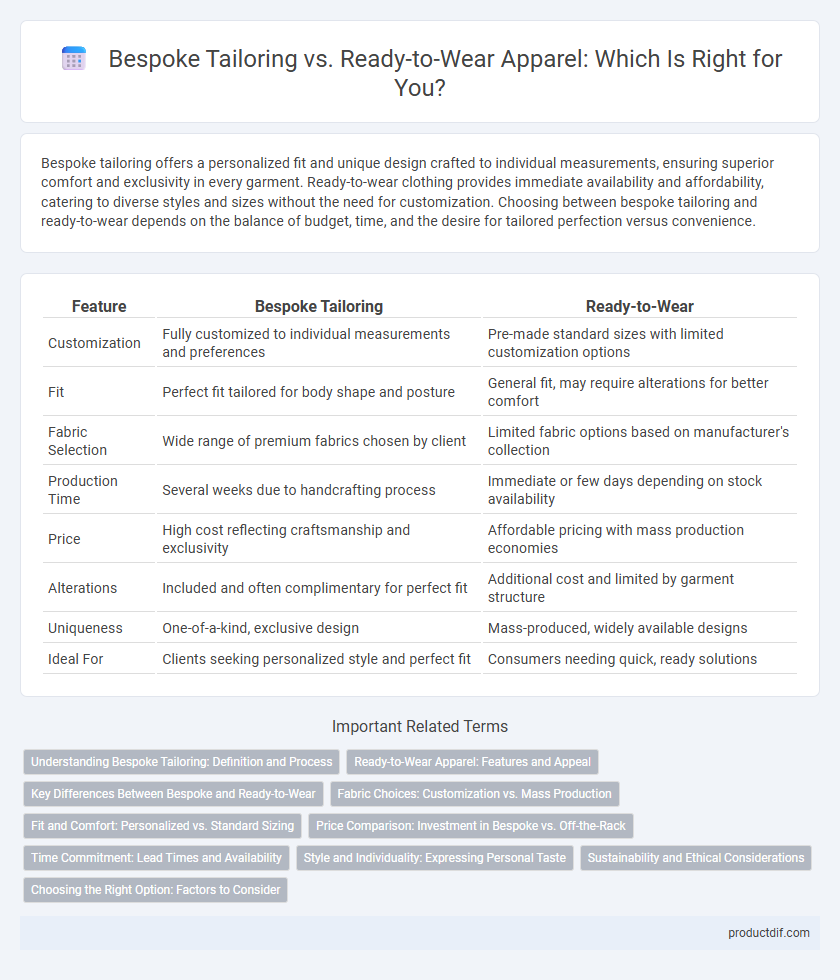Bespoke tailoring offers a personalized fit and unique design crafted to individual measurements, ensuring superior comfort and exclusivity in every garment. Ready-to-wear clothing provides immediate availability and affordability, catering to diverse styles and sizes without the need for customization. Choosing between bespoke tailoring and ready-to-wear depends on the balance of budget, time, and the desire for tailored perfection versus convenience.
Table of Comparison
| Feature | Bespoke Tailoring | Ready-to-Wear |
|---|---|---|
| Customization | Fully customized to individual measurements and preferences | Pre-made standard sizes with limited customization options |
| Fit | Perfect fit tailored for body shape and posture | General fit, may require alterations for better comfort |
| Fabric Selection | Wide range of premium fabrics chosen by client | Limited fabric options based on manufacturer's collection |
| Production Time | Several weeks due to handcrafting process | Immediate or few days depending on stock availability |
| Price | High cost reflecting craftsmanship and exclusivity | Affordable pricing with mass production economies |
| Alterations | Included and often complimentary for perfect fit | Additional cost and limited by garment structure |
| Uniqueness | One-of-a-kind, exclusive design | Mass-produced, widely available designs |
| Ideal For | Clients seeking personalized style and perfect fit | Consumers needing quick, ready solutions |
Understanding Bespoke Tailoring: Definition and Process
Bespoke tailoring refers to the custom creation of garments specifically designed and crafted to an individual's precise measurements and style preferences, ensuring a perfect fit and unique design. The process involves multiple fittings, hand-cut fabric, and meticulous attention to detail by skilled tailors, resulting in superior craftsmanship compared to ready-to-wear clothing. Understanding bespoke tailoring highlights its emphasis on personalization, quality fabric selection, and craftsmanship that distinguishes it from off-the-rack apparel.
Ready-to-Wear Apparel: Features and Appeal
Ready-to-wear apparel offers immediate availability and standardized sizing, making it a convenient option for consumers seeking fashionable clothing without the wait time of bespoke tailoring. The collection typically features trending styles, diverse fabric choices, and accessible price points, appealing to a broad audience who values both style and affordability. Brands invest in high-quality manufacturing processes and seasonal updates, ensuring ready-to-wear lines remain relevant and attractive in the dynamic fashion industry.
Key Differences Between Bespoke and Ready-to-Wear
Bespoke tailoring offers fully customized garments crafted to individual measurements, providing superior fit and unique fabric choices, whereas ready-to-wear apparel is mass-produced in standard sizes for immediate purchase. Bespoke suits involve multiple fittings and meticulous hand-stitching, enhancing durability and personal style, contrasted with the quicker production and lower cost of ready-to-wear options. The key differences lie in personalization, craftsmanship, and exclusivity, with bespoke tailoring delivering unparalleled individuality compared to the accessibility and convenience of ready-to-wear fashion.
Fabric Choices: Customization vs. Mass Production
Bespoke tailoring offers extensive fabric choices with personalized options including rare wools, silks, and linens selected to match individual preferences and seasonal needs. Ready-to-wear garments typically use standardized fabrics produced in bulk, focusing on cost-efficiency and consistent quality rather than unique texture or pattern selection. Customized fabric selection in bespoke suits enhances fit, comfort, and exclusivity, contrasting with the limited variety available in mass-produced apparel lines.
Fit and Comfort: Personalized vs. Standard Sizing
Bespoke tailoring offers a superior fit through precise measurements tailored to an individual's unique body shape, ensuring optimal comfort and a flattering silhouette. Ready-to-wear garments rely on standard sizing grids that accommodate average body dimensions, often resulting in less personalized fit and potential comfort compromises. The customization in bespoke clothing significantly enhances wearability by addressing specific fit nuances, unlike the generalized approach of ready-to-wear apparel.
Price Comparison: Investment in Bespoke vs. Off-the-Rack
Bespoke tailoring commands a higher price point due to its customized fit, premium fabrics, and artisanal craftsmanship, often ranging from $2,000 to $5,000 per suit. Ready-to-wear apparel offers affordability with prices typically between $200 and $700, benefiting from mass production and standardized sizing. While bespoke represents a long-term investment in durability and personalization, ready-to-wear suits provide immediate accessibility at a fraction of the cost.
Time Commitment: Lead Times and Availability
Bespoke tailoring demands significant lead times, often requiring several weeks to months due to personalized measurements and handcrafting processes. In contrast, ready-to-wear garments offer immediate availability, catering to customers seeking quick fashion solutions without delay. Time commitment in bespoke creates exclusivity and precise fit, while ready-to-wear maximizes convenience and faster wardrobe updates.
Style and Individuality: Expressing Personal Taste
Bespoke tailoring offers unparalleled opportunities for expressing personal taste through custom fabric choices, precise measurements, and unique design details, resulting in garments that perfectly reflect an individual's style and personality. Ready-to-wear apparel, while convenient and trend-responsive, often lacks the distinctive customization that bespoke pieces provide, limiting individuality in style expression. The emphasis on tailored fit and personalized elements in bespoke clothing enhances self-expression, making it a preferred choice for those seeking to showcase their unique fashion identity.
Sustainability and Ethical Considerations
Bespoke tailoring offers sustainable advantages by promoting longevity through custom-fit garments crafted from high-quality materials, reducing fashion waste compared to the mass-produced, fast fashion model of ready-to-wear clothing. Ethical considerations favor bespoke pieces because they often involve skilled artisans paid fair wages, contrasting with ready-to-wear apparel's frequent reliance on factory production with less transparency in labor practices. Sustainable fabrics and personalized production cycles in bespoke tailoring minimize environmental impact, aligning with growing consumer demand for responsible fashion choices.
Choosing the Right Option: Factors to Consider
Bespoke tailoring offers unparalleled customization, precise fit, and premium fabric selection, making it ideal for individuals seeking unique, high-quality apparel. Ready-to-wear provides convenience, affordability, and immediate availability, suited for those prioritizing quick purchase and modern fashion trends. Essential factors include budget, timeline, body measurements, occasion, and personal style preferences.
Bespoke Tailoring vs Ready-to-Wear Infographic

 productdif.com
productdif.com